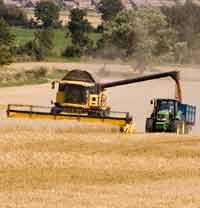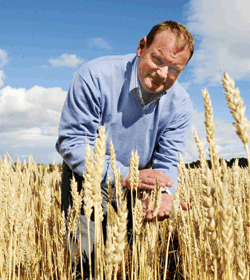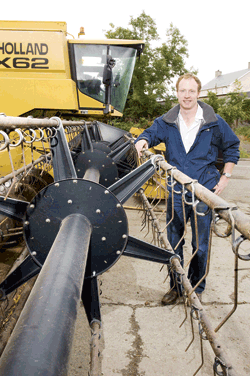Barometer farmers play catch-up as the weather finally improves

Farmers Weekly’s Scottish and Irish Barometer farmers have been playing catch-up as the weather finally improved. James Andrews reports

Mike Eagers was making the most of a two-week dry spell after 10 days of heavy rain halted progress on Trinlaymire Farm near Edinburgh.
Bringing in an extra Sentry Farm combine from the south allowed him to make up for lost time. “We are now running two Lexion 600s and one 580, all on tracks, and have just about caught up.”
On Tuesday, (15 September) he had 120ha winter wheat left to cut, which he hoped to finish by the weekend. “The forecast is dry for the next 5-6 days so it shouldn’t be a problem.
“We’ve cut 165ha Alchemy winter wheat so far, but had to move onto spring barley as we had no space left to tip it.”
Alchemy yields were slightly higher than last year’s 7.5t/ha, averaging 8t/ha, but were still below the 9t/ha achieved in drier years. Bushel weights were disappointing at 72-73kg/hl, he said. “The weather has really affected quality – the grains look very weathered and haven’t filled. Ironically, it’s been coming off at 16% moisture and has been flying through the dryer.”
The sustained wet spell meant it had been impossible to subsoil and rectify last year’s soil damage, and he was concerned that he would have to abandon minimum tillage operations and use the plough.
“But it is now bone dry on the surface and there is dust coming off the field.”
He managed to plant 100ha of Temple oilseed rape in the second week of August before the weather broke, which is already up. “We got it in as soon as the ground was clear and it’s looking good.”
He planted a further 60ha on 14 and 15 September after the weather improved. “It was past the recommended drilling date, but I committed to the seed just before the weather broke, so had to do something with it.”
All first wheats had also been established after oilseed rape. “We planted 120ha of Alchemy and will now concentrate on winter barley.”
He reckoned two weeks of decent weather would allow him to complete drilling.
His Alvan Blanch continuous-flow dryer had been running 24 hours a day before the weather broke and the biggest challenge had been Pearl malting barley at 19-20% moisture. As it could only be heated to 60C it was a slow process, he said.
“Pre-germination is a major concern and merchants aren’t exactly crying out for it.”
Latest ever start

A wet summer and a large area of late-drilled spring crops meant James Wray made the latest ever start to his harvest in Dungiven, County Londonderry.
“We didn’t get the combine out of the shed until the 7 September.”
But despite the delay he remained optimistic. Wet weather had had little impact on quality, the ground was still relatively dry, wheat straw yields were high, and, at £17 per round bale, the price was making up for poor cereal returns.
“I have phone calls every day from livestock farmers desperate to get hold of straw – there is nothing left from last year and they are panic buying.”
After cutting 80ha Quench and Westminster spring barley, with variable yields of 5-6t/ha, he moved into 34.5ha Zebedee winter wheat. “It has been a breeze, coming in at 16% moisture, which is unheard of for us.”
Yields were also high, averaging just under 10t/ha, and he was getting nine round straw bales per acre. “It has been fantastic considering it was drilled at the end of February and at one point we doubted it had vernalised.”
On Tuesday (15 September), the first damp morning since 7 September had brought combines to a standstill. But the forecast was brighter for the afternoon and the next few days, he said.
“If it stays clear for the week we should be able to clear up – I would be very happy to finish by the end of September.”
Heavy dew was slowing progress and meant the combines could only work between 12pm and 7pm. But running two machines meant he could make the most of the available time.
“As soon as the combines are put away we have 80ha potatoes to get out – 20ha have already been desiccated with Reglone (diquat dibromide).
“They are looking fantastic – there is a bit of scab, due to dry weather at tuber initiation, but yields are promising.”
However, the price of £60-70/t was very disappointing as he reckoned he would needed £100/t to break even.
“We’ll see how well we get on with the spuds, but we’ve got 120ha winter wheat to get in afterwards.”
Following a successful germination test, he also hoped to plant 40ha Retriever winter barley from last year’s seed in the first week of October.

